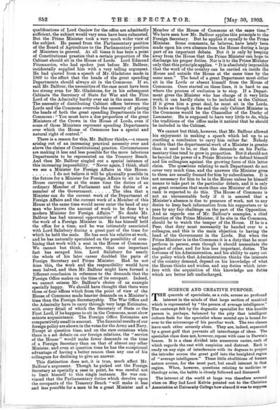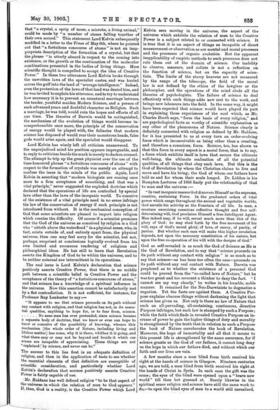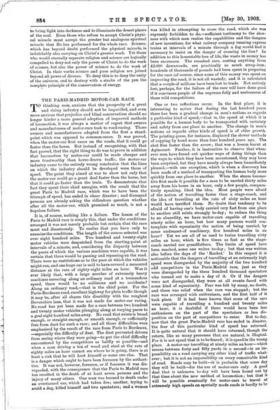SCIENCE AND CREATIVE PURPOSE.
THE quarrels of specialists, as a rule, arouse no profound interest in the minds of that large section of mankind which is represented by " the person of average intelligence." The contempt felt by the dogmatic specialist for this humble person is, perhaps, balanced by the pity that intelligent culture feels for the specialist whose mental eye is bound for ever to the microscope of his peculiar work. The two classes leave each other severely alone. They are, indeed, separated by a great gulf that prevents all interchange of ideas. The specialist class does not, however, repose with ease in Darwin's bosom. It is a class divided into numerous castes, each of which regards the rest with suspicion and distrust. Each is ready on any sign of interference with its dogmas to project the intruder across the great gulf into the benighted region of " average intelligence." These little ebullitions of human nature arouse, for the most part, but small interest in that region. When, however, questions relating to medicine or theology arise, the battle is closely followed and discussed.
The interest of the world at large was therefore aroused when on May 2nd Lord Kelvin pointed out to-the-Christian Association at University College how absurd it was to suppose
that" a crystal, a sprig of moss, a microbe, a living animal," could be made by "a number of atoms falling together of their own accord." This statement Lord Kelvin subsequently modified in a letter to the Times of May 6th, where he pointed out that " a fortuitous concourse of atoms " is not an inap- propriate description of the formation of a crystal, but that the phrase " is utterly absurd in respect to the coming into existence, or the growth or the continuation of the molecular combinations presented in the bodies of living things. Here scientific thought is compelled to accept the idea of Creative Power." In these two utterances Lord Kelvin broke through the unwritten laws of the specialist castes, and was hurled across the gulf into the land of "average intelligence." Indeed, even the protection of the laws of that land was denied him, and he was invited to explain his utterance, and to try to understand how necessary it is to prevent an unnatural marriage between the tender, youthful maiden Modern Science, and a person of such advanced years and doubtful character as Religion. Such a marriage, be was told, would ruin the hopes and efforts of all our time. The theories of Darwin would be extinguished, the mechanism of the evolution of things would become in- comprehensible once more, the principle of the conservation of energy would be played with, the fallacies that modern science has disposed of would rear their monstrous heads, false gods would arise again, and the specialist would disappear.
Lord Kelvin has wisely left all criticism unanswered. To the unprejudiced mind his position appears impregnable, and to reply to criticism beside the mark is merely to darken counsel. The attempt to trip up the great physicist over the use of the time-honoured phrase "a fortuitous concourse of atoms" with respect to the formation of crystals was merely an attempt to confuse the issue in the minds of the public. Again, Lord Kelvin in asserting that "modern biologists are coming once more to a firm acceptance of something, and that was a vital principle," never suggested the exploded doctrine which declared that the operations of life are controlled by special laws other than the laws of the inorganic world. To conceive of the existence of a vital principle need in no sense infringe the law of the conservation of energy if such principle is not introduced from without. It is the mechanical conception of God that some scientists are pleased to import into religion which creates the difficulty. Of course if a scientist premises that the God of the universe as conceived by religion is a God who " sitteth above the waterflood " in a physical sense, who, in fact, exists outside of, and entirely apart from, the physical universe, then one may feel sorry for the scientist, but not, perhaps, surprised at conclusions logically evolved from his own limited and erroneous rendering of religious and philosophical ideas. He has still to learn that Revelation asserts the Kingdom of God to be within the universe, and to be neither external nor intermittent in its operations.
The real issue is Lord Kelvin's declaration that science positively asserts Creative Power, that there is no middle path between a scientific belief in Creative Power and the acceptance of the theory of " a fortuitous concourse of atoms," and that science has a knowledge of a spiritual influence in the universe. Now this assertion cannot be satisfactorily met by a flat contradiction. It is not sufficient, for instance, for Professor Ray Lankester to say
" It appears to me that science proceeds on its path without any contact with religion, and that religion has not, in its essen- tial qualities, anything to hope for, or to fear from, science.
No sane man has ever pretended, since science became a separate body of doctrine, that we know or ever can hope to know or conceive of the possibility of knowing, whence this mechanism [the whole order of Nature, including living and lifeless matter] has come, why it is there, whither it is going, and what there may or may not be beyond and beside it which our senses are incapable of appreciating. These things are not explained' by science, and never can be."
The answer to this lies first in an adequate definition of religion, and then in the application of tests to see whether the essential elements of that definition are susceptible of scientific consideration, and particularly whether Lord Kelvin's declaration that science positively asserts Creative Power is fairly capable of use.
Mr. Haldane has well defined religion " to be that aspect of the universe in which the relation of man to God appears." If, then, God is a reality, is the Creative Power which Lord
Kelvin sees moving in the universe, the aspect of the universe which exhibits the relation of man to the Creative Power is a subject related to or connected with science. It is true that it is an aspect of things as incapable of direct measurement or observation as are mental and moral prooesses and the processes of organic evolutiOn. But the apparent inapplicability of empiric methods to such processes does not' rule them out of the domain of science. Our inability to observe, measure, and collate is not a reflection on the function of science, but on the capacity of scien- tists. The limits of the starry heavens are not measured by the range of the telescope, the field of the moral law is not defined by the ethics of the lawgiver or the philosopher, and the operations of the mind elude all the theories of psychologists. The failure of science to deal effectively with such things adds new zest to the work, and brings new labourers into the field. In the same way, it might have been expected that science would have played its part in explaining those experiences of the soul which, as Mr. Charles Booth says, "form the basis of every religion," and are psychological facts as worthy of scientific explanation as any other of the phenomena of Nature. Science clearly is definitely connected with religion as defined by Mr. Haldane, for it has presented to us at every turn an order-evolving force which is inconceivable as being other than a creating, and therefore a conscious, force. Science, too, has shown us that this force in every aspect is a moral force, that is to say, a force which exhibits itself in laws that secure the ultimate well-being, the ultimate realisation of all the potential qualities, of all things that obey such laws. But this is the God of Revelation by whom the Christian claims to live and move and have his being; the God of whom our fathers have told us and for whom their souls longed. Dr. Liddon in his Hampton Lectures of 1866 finely put the relationship of God to man and the universe :- " In vast inorganic masses God discovers Himself as the supreme, creative, sustaining Force. In the graduated orders of vital power which range throughout the animal and vegetable worlds, God unveils his activity as the Fountain of all life. In man, a creature exercising conscious reflective thought and free self- determining will, God proclaims Himself a free Intelligent Agent. Man indeed may, if he will, reveal much more than this of the glory of God : he may shed forth by the free movement of his will, rays of God's moral glory, of love, of mercy, of purity, of justice. But whether each man will make this higher revelation depends, not upon the necessary constitution of his nature, but upon the free co-operation of his will with the designs of God."
God so self-revealed is as much the God of Science as He is the God of Revelation, and to say that " science proceeds on its path without any contact with religion " is as much as to say that science—as has been too often the case—proceeds on its path without any real contact with Nature. Darwin was perplexed as to whether the existence of a personal God could be proved from the "so-called laws of Nature," but he was too great and too reverent a thinker to deny the fact. " I cannot see my way clearly," he writes in his humble, noble manner. It remained for the Neo-Darwinists to dogmatise a negation. Yet the facts are against them. A Creative Pur- pose explains obscure things without darkening the light that science has given us. Not only is there no law of Nature that such an all-pervading, all-sustaining, continuous, directive Purpose infringes, but each law is stamped by such a Purpose; while the faith which finds in revealed Creative Purpose an in- crease of power to gain the higher things of duty and morality is strengthened by the truth that in relation to such a Purpose the book of Nature corroborates the book of Revelation. Moreover, the hope of immortality and all that it means to this present life is strengthened by the same assurance, for if science grants us the God of our fathers, it cannot long deny us the hope in which our fathers died, and without which our faith and our lives are vain.
A few months since a man blind from birth received his sight at the bands of science in Glasgow. Nineteen centuries ago, we are told, a man blind from birth received his sight at the hands of Christ in Syria. In each case the gift was the same ; the eyes of the blind were opened upon a " brave new world" till then but guessed at. Surely likewise in the spiritual sense religion and science have still the same work to do,—to open the blind eyes of men to a world still unrealised, to bring light into darkness and to illuminate the desert places of the soul. Even those who refuse to accept Christ's physi cal miracle must accept the greater but analogous spiritual miracle that He has performed for the whole race. Science, which has beyond doubt performed the physical miracle, is indubitably also carrying on Christ's greater work. Yet those who would eternally separate religion and science are logically compelled to deny not only the power of Christ to do the work of science, but also the power of science to do the work of Christ. In their works science and pure religion are joined beyond all power of divorce. To deny this is to deny the unity of the universe, and to destroy with a stroke of the pen the complete principle of the conservation of energy.








































 Previous page
Previous page